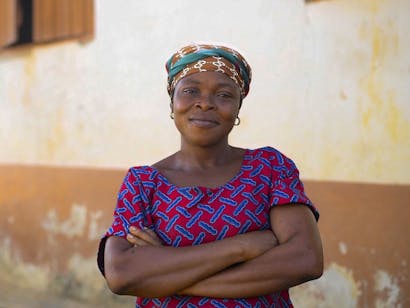CARE’s PEGESMAS project continues despite conflict in Sudan
Sudan, a country marred by conflict and economic challenges, is facing a deepening crisis with devastating consequences for its civilian population. The fighting between the Sudanese Armed Forces (SAF) and the Rapid Support Forces has led to widespread displacement, destruction, and increased humanitarian needs. Amidst this turmoil, the Promoting Economic Empowerment and Gender Equity through Strengthened Market Systems (PEGESMAS) project continues to work diligently to empower women smallholder farmers in the state of South Kordofan.

CARE’s PEGESMAS project
The PEGESMAS project was launched on November 1, 2022, and is set to conclude on April 30, 2024. Its primary focus is to address the prevailing poverty and socioeconomic marginalisation experienced by rural farming communities in Sudan, specifically in South Kordofan. These communities have endured significant impacts from years of conflict, displacement, and limited access to agricultural resources, training, and markets. Within the agricultural sector of South Kordofan, smallholder farmers, particularly women farmers who constitute the majority, face substantial challenges due to deeply entrenched gender inequality.
The key aim of the PEGESMAS project is to empower women smallholder farmers by granting them control and access to essential agricultural resources and markets. Through this empowerment, the project strives to foster women’s entrepreneurship and contribute to enhanced food security at both the community and household levels. To accomplish these objectives, the project takes a comprehensive approach, including the creation of economic opportunities for female smallholder farmers, the enhancement of capacity among key stakeholders in the mango and vegetable value chains, and the strengthening of business connections between women-led farmer groups and the private sector. Additionally, the project endeavours to establish an enabling environment by improving women’s financial access, challenging detrimental gender norms, and combating gender-based violence.

The implementation of the PEGESMAS project is carried out by CARE and is funded by the Dutch Ministry of Foreign Affairs. It directly benefits 17,306 individuals, including internally displaced persons (IDPs) and vulnerable members of the host community. The project operates in ten communities located in the localities of Abujubeiha (Abu-Ndkina, Sambo, Karima, and Tayba) and Rashad (Debaikir, Taroba, Tandik, Tajmala, Algardod, Algrewid).
Persevering project operations amid ongoing conflict
The ability of the PEGESMAS project to continue working despite the conflict in Sudan holds great significance. In the face of challenging circumstances, the project has remained steadfast in its commitment to its objectives. Understanding the urgency of empowering women smallholder farmers and addressing gender inequality and socioeconomic marginalization, the project has persisted to make a difference in the lives of affected communities.
One key reason for the project’s crucial continuation is its focus on creating economic opportunities for female smallholder farmers in South Kordofan’s mango and vegetable value chains. By empowering women to actively participate in these value chains, the project aims to enhance their income-generating capabilities and improve food security for both communities and households. In a region that has long suffered from poverty and limited access to resources, the interventions provided by the project act as a lifeline for women in vulnerable positions, offering them the means to uplift themselves and their families from the clutches of poverty.

Additionally, the project recognizes the importance of building the capacity of key actors within the value chains. By equipping farmers, traders, and other stakeholders with the necessary knowledge, skills, and resources, the project not only improves their individual livelihoods but also contributes to the overall development and professionalization of South Kordofan’s agricultural sector. This has broader implications for the local economy, as the project encourages market-based approaches that can benefit both the communities and the national economy as a whole.
The establishment of business linkages between women-led farmer groups and the private sector is another critical aspect of the project. By forging connections and partnerships with private entities, the project opens doors for women farmers to access markets, expand their customer base, and secure fair prices for their products. This not only increases their economic independence but also contributes to the resilience and sustainability of the agricultural value chains in the region.
Furthermore, the project’s efforts to create a more inclusive market environment for women are of significant importance. By addressing barriers such as limited access to finance, harmful gender norms, and gender-based violence, the project strives to dismantle the structural and societal obstacles that have hindered women’s full participation in the agricultural sector. Engaging men and boys as allies and change agents is an essential component, fostering a supportive and enabling environment that promotes gender equity and equal opportunities for all.

Amidst the ongoing conflict, the continuation of the PEGESMAS project serves as a powerful testament to resilience and hope. It demonstrates that even in the most challenging circumstances, development initiatives can still have a positive impact on the lives of the most vulnerable. By persisting in their efforts, the project and its partners become beacons of stability and support for the affected communities, showing that progress is possible even in the face of adversity.
In conclusion, the ability of the PEGESMAS project to continue working amidst the conflict in South Kordofan, Sudan, holds immense significance. Through empowering women smallholder farmers, fostering economic opportunities, and addressing gender disparities, the project not only improves livelihoods but also contributes to the broader development and resilience of the agricultural sector. In the midst of ongoing conflict and humanitarian challenges, the project’s commitment to its goals serves as a beacon of hope, showcasing the transformative power of empowerment, inclusion, and sustained support for marginalized communities.


